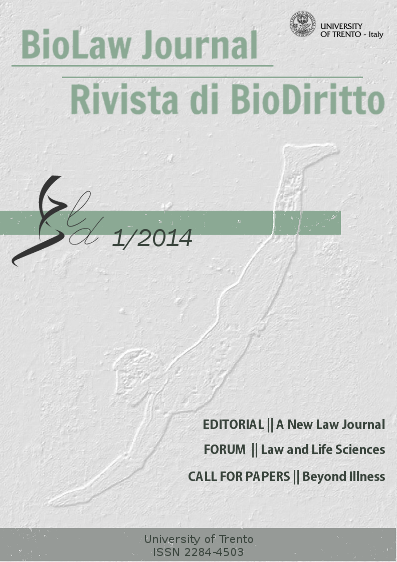Tutela della salute e della libertà della ricerca scientifica nelle nuove biotecnologie di sintesi in campo genetico. Dai brevetti “biotech” ai modelli “open source”
DOI:
https://doi.org/10.15168/2284-4503-17Parole chiave:
synthetic biology, Biobricks, biotech patent, freedom of scientific research, open source modelsAbstract
New synthetic biotechnologies provide important opportunities for care and research, which could have a greater or smaller development in relation to how Law and various legal systems will discipline this new emerging field of artificial development of drugs, therapies, biotech products. The large-scale protection of human health is, in fact, strongly influenced by free availability of genetic codes, both of natural and artificial nature, on which synthetic biotechnologies are based and that will influence future biomedical sciences. The same perspective regards freedom and pluralism of scientific research, which could be hampered in systems predominantly oriented to the protection of unilateral biotech patents: the gradual establishment of monopolies on biogenetic knowledge, in fact, would prevent the use, even for the purpose of research, of the so called "coding units" (BioBricks). The analysis of European and international jurisprudence highlights the ongoing conflict between economic interests and the protection of the emerging fundamental rights in these issues. Nevertheless, it can be noted in the judgments of some courts a slow evolution from an economic-juridical system based on the pre-eminent legal protection of biotech patents and of the underlying economic interests, towards a model based on the guarantee of “rights of access” and fundamental rights. In this context, the author suggests an evolution of the current legislation towards a mixed model based on a variable protection of all rights and interests involved: a system which guarantees, on the one side, the free sharing of discoveries and coding units and, on the other one, intellectual property rights on actual inventions (starting from the personal rights of the researchers), tuning the type of protection on the nature of the underlying genetic resource. This, in order to realign the legal function of biotech patent to the pre-eminent protection of the human health and the freedom of scientific research, public and private one.





